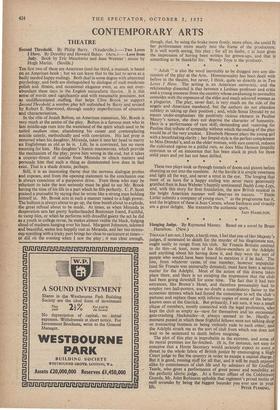Hanging Judge. By Raymond Massey. Based on a novel by
Bruce Hamilton. (New.)
THOUGH I am not, 1 hope, a harsh man, I feel that one of Her Majesty's judges, if sentenced to death for the murder of his illegitimate son, ought really to resign from his club. Sir Francis Brittain omitted to do this—at least, none of his fellow-members at the Adelphi said anything about his having done it, and they were the sort of people who would have been bound to mention it if he had. The loss, from whatever cause, of one member, however unpopular (and Sir Francis was universally detested), must have been a serious matter for the Adelphi. Most of the action of this drama takes place there, and there is no escaping the impression that the club had been going downhill for some time. The fact that it had two entrances, like Brown's Hotel, and therefore presumably had to employ two hall-porters, was no doubt a contributory factor to the economic stresses which had forced the committee to sell the club's pictures and replace them with inferior copies of some of the better- known ones at the Garrick. But primarily, I am sure, it was a small clique of members, mostly connected with the legal profession, who kept the club as empty as—save for themselves and an occasional gate-crashing blackmailer—it always seemed to be. Hardly a moment passed in which these frightful fellows were not talking shop or transacting business or being violently rude to each other; and the Adelphi struck me as the sort of club from which one does not wait to be sentenced to death before resigning.
The plot of this play is improbable in the extreme, and some of its moral premises are far-fetched. (It is, for instance, not easy to conceivo that a Home Secretary would seriously expect to avert a threat to the whole fabric of British justice by encouraging a High Court judge to flee the country in order to escape a capital charge.) But it is good, rousing stuff for all that, and it will be much enjoyed alike by connoisseurs of club life and by admirers of Sir Godfrey Tearle, who gives a performance of great power and sensibility as the perfectly idiotic judge. As a former officer of the Coldstream Guards, Mr. John Robinson upholds that regiment's proud motto of nulli secundus by being the biggest bounder you ever saw in your


















































 Previous page
Previous page